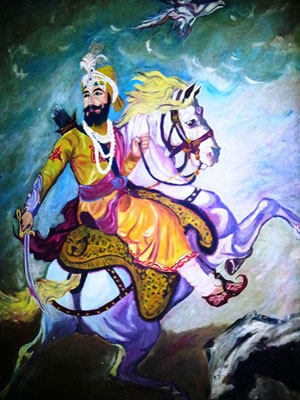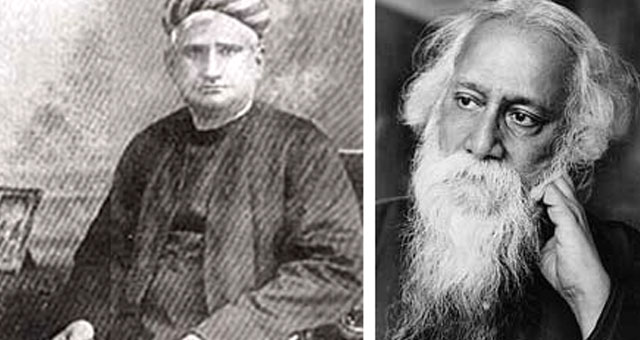Baje Katha – (Trash talks) of the book ‘Bichitra Prabhanda'(Miscellaneous Essays) written in 1902.
[Translators note: In America Shakespeare is going to be dropped from their University currecula. This is only a pointer to the steady decline in the interest for aesthetics and abstracts among the literati worldwide. However, even among the literati those with such a penchant were never a formidable sect as the Poet points out in this essay. His advice to this small minority was to leave the formidable group alone as ‘they are powerful and judgment is often in their hand’. But did he foresee that this ‘powerful’ group would turn back one day and start steam rolling literature with their ‘utilitarian’ dogma as evidenced by the modern Shakespeare bashing? However, besides this blatant attack on aesthetics, other forces were also contributory to the gaining momentum of utilitarianism. ‘Kalidas’ (inter alia) has taken refuge to the hands of an insignificant number of scholars, Sanskrit being a ‘dead’ language now. One may apprehend (believing in Aldus Huxley’s prediction that the only surviving language will eventually be English, while number of his other predictions are frighteningly coming true e.g. human cloning etc.) Bengali is also following suit and Tagore too will have the fate of Kalidas which is only a question of time. The cyber age, fast commercializing education via internet, may fix the last nail on the coffin of Aesthetic much sooner than we can imagine.]
Man is more revealed by his lavish expenditure rather than by his economy., as the latter is based on set of rules while the former is his freak. Likewise, since the time of Manu (a wise man of ancient India setting up norms for ideal life). the track on which business talks drag the cart, has been stamped barren of grass and flower by the tramples of the workaholics. So, the trash talks must be one’s exclusive.
Thus, the rigid estoppels of Chanakya (another wise man of ancient India famous for his shrewd logic/advice) for some particular persons (fools) to keep mum, may be amended a bit. The gentleman of Chanaky’s conjecture who speaks ‘high level’ and declares only ‘Time tested Truth’, lands in peril whenever he will strive for easy talks in his own way.
The man who is mum but for churning out Vedic sermons (Veda is the oldest scripture dating back to nearly 5000 years), O lord, his company, camaraderie or neighboring may never be my fate! Everything on this Earth is not self-expressive. Coal does not burn without fire whereas sapphire glitters without reason. The coal is to run the mills but the sapphire is to stitch into the garlands to deck the neck of our dear ones. Coal is useful but sapphire is precious.
There are some rare persons who, like sapphire, glisten aimlessly. They express themselves easily without an occasion, Nobody has any urge to have a specific need fulfilled by him. He is self illumined and that alone is others’ delight. A man’s love for expression and light is so intense that even at the cost of his bread he is tempted to brightness. This craze shows that man is greatest of all insects staking their lives at the brightness of the fire.
Not all insects are born with wings, neither with an attraction for the bright. Many are wise and calculative. They may dive into the depths of a cave for a booty, but hardly attempt to fly high at the sight of the light. On encountering poetry they will ask what is there to be gained out of it. However, they may generously eulogize or cry down a prose piece depending on how far it tallies with our doctrines, religious or otherwise. They have no avidity for the non-utilities or superfluities.
Those who worship illumination, have no penchant for this sect. However, we do not approve of their adverse comments for the latter. Barruchi (a literary jewel, out of nine, in the court of King Vikramaditya, a great patron of learning and culture in 600 AD) termed them as ‘duds’ which we consider as uncivil. We keep within ourselves what we think of them. But those of the yore would not thus hold their tongue as evidenced by the Sanskrit verse- “A pearl dug out by a lion aground in a forest was noticed by an aborigine woman there to pick it up hastily. But as she realized that it was not a ripe fruit, but a mere pearl, she threw it away”. It is clear, those who are utilitarian, not in the least moved by beauty and brightness, are comparable with the rustic woman. We consider that the poet had better been reticent about them as they are powerful and the judgment is often in their hand. They act as Headmasters. I pray, those who are residents in the lotus garden of Saraswati (Goddess of Learning, music and art) do not incite their neighbors in the cane forest.
The real trash in literature does not have impertinence ‘to make a point’. Meghdoot (composed by Kalidas, one of the nine jewels in the Court of Vikramaditya, as aforesaid) in Sanskrit literature is its living example. It is neither on religion nor on business, mythology or history. It is a rigmarole of a state of human mind when they lose judgment. If one picks it up with the expectation of filling up the tummy, will throw away at once. It is a solid pearl, a bit stained by the blood of a loner’s heart, but it won’t be devalued even by rubbing that out.
As it is without purpose, Meghdoot is so transparent and bright. It is a myth boat, with its sail of cloud boosted by the wind of imagination to ferry the pining of a lonely heart with unstinted momentum for an aimless destination, ineffable“ without further burden on it.
Meghdoot is the literature of ‘idle tears’ Tennyson talks of. Some may be tempted for a debate with me on this. They may argue, while Yaksha on the curse of his master is wide apart from his fiance, why I would call his tears ‘idle’? Without going into this controversy, I may stress that exile of Yaksha and the other paraphernalia are all fabrication of Kalidas for a plea to compose his literature. On that scaffold he took support to build his mansion and we’ll now scrap the former. The salient point is, human mind at times goes inoperative without logic. As the monsoon strikes, the dense clouds unleash an exotic separation-al nostalgia, that founts Meghdoot’s rigmarole. Had it not been so, the loner, instead of the cloud, would have chosen its lightning as his messenger. But the choice has been for the Eastern Cloud that so sluggishly, with so much dilly dally, animating the forests leisurely proceeds at a snail’s pace, gaining the stare of many a fair maid of the habitats (the Poet attempts here to give us a glimpse of the rambling character with tilt for details of Meghdoot or Sanskrit literature as a whole of that time). Even at the time of reading literature if we must open the books of accounts to record our profit and loss, I would admit my wonder at the discovery of the truth that even in those days Man was there and that on the first day of the monsoon months the nostalgic cloud would appear with regularity and all its grandeur.
But, those to whom Barruchi had addressed his invectives, will they consider such a gain as ‘gain’ at all? Will this spread knowledge, enrich the country or improve our character? So, O Lord Brahma (the God of Creation), let whatever superfluous be the maestros’ exclusive, the utilities and beneficial will always have their customers.





